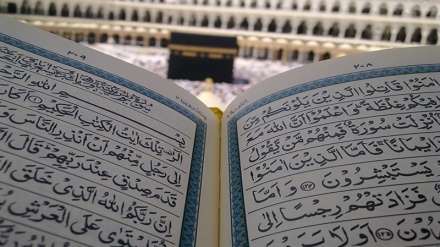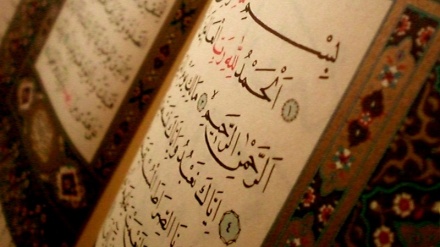Path towards Enlightenment (1021)
Salaam, and welcome to our latest episode of “Path towards Enlightenment”, which is an endeavour to make you and us familiar with an easy and fluent explanation of God’s Final Scripture to all mankind, the holy Qur’an that was revealed to the Last and Greatest of all Messengers, Prophet Muhammad (blessings of God upon him and his progeny).
For the past two weeks we have embarked on the explanation of “Surah Mulk, the number 67 in the serial order of compilation of the holy Qur’an. Revealed in Mecca, it has 30 Ayahs and opens with the sentence “Blessed is He in Whose hands is all sovereignty”, thus deriving its name from “Divine Sovereignty” or “Mulk” in Arabic. It is also called “Blessed” from the opening word “Tabarak”. This Surah challenges the disbelievers with declarations of God’s Infinite Power over them and over everything else in the world, in afterlife, and in the universe by focusing on the marvelous and orderly system of creation. It also describes the regret the disbelievers will express on the Day of Resurrection. It is highly recommended to recite Surah Mulk every night.
We start from where we left you last Friday and here is Ayah 15:
“It is He who made the earth tractable for you; so walk on its flanks and eat of His provision, and towards Him is the resurrection.”
If you might recall, in our explanation last week of the previous Ayahs of this Surah, we said faith and true belief are correctly ascertained only when a person is always conscious of the Omnipresent Almighty, whether in a secluded place or in public. The Creator is aware of all our intentions and motives, including thoughts that flash across minds; thus hypocrisy is self-destruction without any benefits, while proper cognizance of God the Omnipresent prevents a person from sins and evil deeds.
The Ayah which we recited to you now means to say that the Earth has been made tractable for mankind, and despite a number of motions, it is tranquil. Even its rotation around the sun as it revolves on its axis to regulate days and nights, is so gentle that no jerks or disruptions in our routine life are felt. At the same time, the atmospheric pressure of the Earth is so moderate that it allows the smooth functioning of life. So, we ought to be grateful to the Almighty Creator for His bounties and while enjoying the pleasures of life, including eating and drinking of the plentiful provisions that He has made available to us, we should be cognizant of the fact that after the death of the physical body we will be raised to life on the Day of Resurrection for the final judgement.
This Ayah teaches us that:
- Allah has made the Earth hospitable for life, especially of the best of creation, that is, mankind, and blessed it with innumerable bounties in the form of sweet water, fruits, flowers, birds, animals, and the beauty of nature, such as mountains, valleys, forests, rivers, and seas, to enjoy.
- Allah has guaranteed the sustenance of everyone and has urged efforts to increase it through lawful and legitimate endeavours, such as agriculture, industry, trade, education, inventions, and the like.
- Success in the transient life of the mortal world should not make us negligent of our duties towards our Creator to Whom is our eventual return.
Here we present you Ayahs 16 and 17 of the same Surah:
“Are you secure that He Who is above the heaven will not make the earth swallow you while it quakes?
“Are you secure that He Who is above the heaven will not unleash upon you a rain of stones? Soon you will know how My warning has been.”
These Ayahs refer to the inherent weakness of all creatures, including human beings enjoying the bounties and the tranquility of the Earth, vis-à-vis the Infinite Power of the Almighty Creator. They mean to say we should not feel proud of whatever little power we have acquired through accumulation of wealth, political positions, and scholarly achievements, to feel that we are safe and secure from Divine Wrath of the All-Merciful Lord in case of committing sins, disbelief, and other crimes, including the trampling of the rights of others.
In other words, natural disasters like quakes, floods, and storms, are both Divine afflictions and tests of our faith. Everything is in the Power of God Who makes the graves of the sinners and disbelievers places of torment, contrary to their false belief of peace after death, which they think will end all troubles of life.
We should thus take heed of Divine warnings by correcting our beliefs, reforming our behaviour, and seeking forgiveness of the All-Merciful God, as well as from people whom we have wronged.
From these Ayahs we learn that:
- Divine punishment is not restricted to the transient life of the mortal world and continues with much more severity in the graves, while those who have not been forgiven will end in the permanent fires of Hell.
- The Almighty Creator is not confined to any particular point, and the phrase “above the heaven” is used in an abstract sense to describe His Exalted Position when compared to all things created.
- The forces of nature are under the control of Allah and nothing occurs except with what He has commanded, whether afflictions or tests.
In conclusion of this week’s episode, here are Ayahs 18 and 19 of Surah Mulk:
“And certainly those who were before them had denied; but then how was My rebuttal!
“Have they not seen the birds above them spreading and closing their wings? No one sustains them except the All-Beneficent. Indeed He sees best all things.”
Ayah 18 refers to the disbelievers, the polytheists, the atheist and the habitual sinners, especially those of the past generations who were afflicted by various forms of punishment, such as quakes, lightning, tempests, landslides, and intense severity of weather conditions that destroyed thriving civilizations and wiped out life.
Allah commands us to study the events of the past to learn from the fate that befell the ruined nations, and the next Ayah draws our attention to the wonders of creation, including the graceful flight of birds flapping their wings while zooming through the air, sometimes for hours and even days by defying the law of gravity. This is all the Handiwork of the Almighty and All-Compassionate Creator Whose Wisdom covers all affairs, and Who is the Best of all observers.
These Ayahs teach us the following points:
- Disbelief, rejection of the Prophets and distortion of their teachings, as well as the intensity of sins, lead to the Divine Wrath in the world, while the punishment of the Hereafter is more severe.
- The history of the past generations enables us to take stock of our own life, abstain from sins, and groom our children in the right way so as to ensure a healthy and God-conscious future.
- The flying of birds for long distances without falling or collision is a sign of Allah’s Power and Greatness.
- The Mercy of the All-Wise Creator is fully evident in all and everything in the universe, including the orderly functioning of our own bodies.
RM/AS/SS


